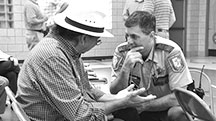
By Brett Larson, September 1, 2015
East Lake meeting scheduled after Band government expresses concerns
In response to pressure from the Mille Lacs Band government, a public meeting about a second proposed pipeline through the District II region took place at East Lake Community Center Aug. 27.
The Band government pushed hard for the meeting after Enbridge Energy, the Public Utilities Commission (PUC) and the Minnesota Department of Commerce scheduled 13 “public information and environmental review scoping meetings” in non-Indian communities along the proposed corridor, but only one on Indian land, at Rice Lake Community Center on the White Earth Reservation.
Enbridge has applied for a permit to re-route Line 3 in the same corridor as the proposed Sandpiper pipeline. Line 3 carries oil from Alberta’s tar sands in Canada to Superior, Wisconsin.
The meetings are part of the Department of Commerce’s “full review” process for projects expected to have a significant environmental impact.
The meeting was added on Aug. 17 to the original schedule, which was published July 23.
Chief Executive Melanie Benjamin was the first to testify after brief presentations from the Public Utilities Commission, the Department of Commerce, and Enbridge Energy. She stressed that the meeting did not constitute government-to-government consultation with the tribes, which the state had still not entered into on either the Sandpiper or Line 3 applications, despite an executive order from Gov. Mark Dayton requiring that agencies do so.
Many Band members and allies spoke in opposition to the pipeline, including Joe Plumer, Dawn Aubid, Azhibik Aubid, Michael Davis, Dante Benjamin, Charlie Lippert, Emily Johnson, Suzanne Wise, Susan Klapel, Russell Shabaiash, David ‘Niib’ Aubid, Katie Draper and Raina Killspotted.
The youngest of the group, Dante Benjamin, introduced himself in Ojibwe and then spoke of the potential impact of an oil spill on the rice, the water and the animals. “We’ve had those lakes for so long,” he said. “We’ve been keeping them clean. We canoe on them. We put out our asema, which is tobacco, before we go. What I’d like to say is, we’re just kids trying to keep our traditional ways and protect our lakes.”
During a break in the proceedings, a sheriff’s deputy asked Niib to move to the other side of the room because he was holding his ceremonial war club, which the deputy thought Enbridge representatives might find intimidating. Niib declined to move.
After the break, Niib urged the attendees to look at the Enbridge representatives seated in the front row. “I want everybody here who lives in this community to take a good look at these Enbridge people,” he said. “It’s the face of genocide and environmental racism. Here it is. Look at it. Look at them. There they are. What they would do to us if they had the chance, and our way of life, our future generations. We can look at them now, but they have to look in the mirror for the rest of their lives and see themselves the way they are. … Do you know who you are? You’re Mr. Environmental Racism. Mr. Genocide. That’s what you would do to the community here of Indian people of East Lake and the surrounding area.”
Niib spoke at length in Ojibwe and directed attention again to the Enbridge representatives. “They just sit there,” he said. “Well, I brought in a gift that was gifted to me, the ceremonial war club, and I think it’s time that it comes out!”
With that, he struck the table forcefully and walked away.
Two meetings in McGregor on Aug. 25 drew large crowds of opponents and a smaller group of supporters. Most supporters were members of plumbing and pipefitting unions.
There is currently an open comment period for this project. Comments will be accepted through September 30, 2015.
Contact the Public Advisor at consumer.puc@state.mn.us, 651-296-0406 or 1-800-657-3782 to sign up for the mailing list.
Report from June Hearing
Chief Executive Melanie Benjamin announced on Aug. 19 that the final report regarding the proposed Sandpiper Pipeline has been submitted to the Band. This report was developed at the request of Chief Executive Benjamin and discusses the environmental damage that the Sandpiper Pipeline could pose to the community.
Information for the report was gathered at a June 5 public hearing at East Lake Community Center. The hearing was coordinated by Melanie and Niib after Enbridge Energy and the Minnesota Public Utilities Commission failed to hold any hearings on tribal lands. More information on the report will be mailed directly to Band members in the near future.